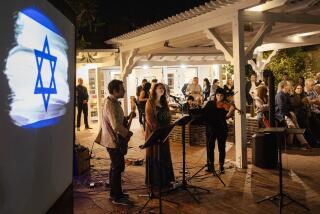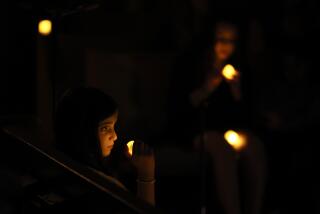Activist escapes battle in Chad
- Share via
A Southern California human rights activist trapped in an African hotel room in the midst of a gunfight between soldiers and rebels crawls across the carpet, feels something hot under his fingers and flinches.
“I touched a bullet,” he says, voice and hands shaking.
Gabriel Stauring, 41, posted the video footage on his website last week after traveling to the Central African country of Chad to document Darfur refugees for his Redondo Beach-based group, Stop Genocide Now.
He was scheduled to return home Feb. 1 from his three-week trip. But when rebels attacked the capital of N’Djamena, Stauring’s flight was canceled and he found himself hiding in the Le Meridien Chari hotel, caught between two rebel targets: the presidential palace and the airport.
With only a handful of French troops protecting the hotel, Stauring frantically e-mailed friends, family, the U.S. government and international aid groups for help.
He had been warned by United Nations workers in Chad that his trip was dangerous. President Idriss Deby, a former general, was clinging to control of the former French colony, a republic more than twice the size of California with a mostly poor, rural population of 10 million. A coup by rebel forces rallying in the east seemed imminent.
But Stauring had heard similar warnings before his first trip to Chad in 2005 and two subsequent trips -- and survived them all unscathed.
This time, he arrived in the capital Jan. 14 and traveled east with three fellow Americans, past mud huts, down remote dirt roads to sprawling Darfur refugee camps -- makeshift villages clustered near the eastern border with Sudan, where rebels had been massing. There was talk that the Sudanese government in Khartoum was helping rebels prepare for a coup.
But trouble seemed to spare Stauring’s group, which included fellow Stop Genocide Now staffer Katie-Jay Scott, 27, of Portland, Ore., and Joshua Sundberg, 32, and Jeremiah Forest, 32, leaders of the Laguna Niguel-based nonprofit World Abundance.
In the camps, Stauring videotaped and wrote about the tens of thousands of refugees who had seen their families massacred during the five-year conflict in Sudan’s western Darfur region. It was inspiring to see friends from past trips, Stauring wrote on the Stop Genocide Now blog, but depressing to see them still living in the camps.
“I try to act with the urgency I would act with if it was my family sitting out here in the middle of the desert,” he wrote. “I’m not sure that I have been living up to that.”
As the group drove back to the capital Jan. 29, they began to see signs of forthcoming conflict. Along the road, clusters of soldiers conferred near sand-colored tanks.
By the time Stauring’s group reached N’Djamena, French military officers were meeting in the bar at Le Meridien, the most expensive, and safest, hotel in town. Sitting on a deck chair near the hotel’s pool, surrounded by a tall barbed-wire fence, Stauring overheard the French ambassador conferring with a French general about the rebels.
But Stauring still was not alarmed. As planned, he packed his bags Feb. 1, checked out of the hotel and waited on the pool patio for a ride to the airport. Only after the hotel manager came to tell him the flight had been canceled did Stauring begin to worry.
He called the U.S. Embassy and started e-mailing. As he waited for news from the embassy, Stauring watched French troops arrive at the hotel, staking out positions on the roof and patrolling the area. They reminded him of the movie “Hotel Rwanda.”
The film, based on a true story during the Rwandan genocide in 1994, got Stauring interested in leading Stop the Genocide in 2004, when he was a behavioral therapist.
In the film, foreign guests are attacked at a Belgian hotel in Kigali, Rwanda’s capital, only to be saved by French troops. But the French leave Rwandans at the hotel to die.
The night before the attack on Le Meridien, the hotel threw a wine and cheese pool party, with a buffet and promises of a local band. Guests filled the patio, including Stauring. The musicians never showed.
Stauring awoke the next morning to the sound of evacuations. He rushed to the hotel lobby, only to see other Americans with the World Bank and World Food Programme evacuate without him and his group.
He could feel the ground tremble with the force of distant shelling, and heard small-arms fire drawing closer.
Chad’s government had cut phone and Internet service to foil the rebels, so Stauring used his satellite phone to call the U.S. Embassy. He was told to stick with French soldiers and, if they left, to try to accompany them.
By afternoon, hotel staff had assembled the remaining 60 to 70 guests in the kitchen of the first-floor restaurant. Stauring and Scott stuck with them for a while, videotaping and writing on their laptops. But in order to send their material overseas, they needed to position their satellite modem higher up. Shortly before 4 p.m., they headed to the hotel’s third floor. They found an unlocked room, and from the third-floor balcony, they surveyed the city that had become a battlefield.
Suddenly, gunfire struck the outside wall. The pair grabbed their computer equipment and dashed across an open-air hallway, down a stairway and across the lobby to the hotel bar. They jumped a low wall and pressed themselves flat against the floor.
A French soldier shouted from the lobby that rebels were shooting into the hotel. Moments later, Stauring and Scott crawled across the carpet. They made it into the kitchen, collapsing against the wall beside the other dazed guests.
Stauring’s first thought was to call his family. But his satellite phone only worked outside. When the gunfire died down, he scurried out to the pool patio, with French soldiers at his side, and dialed his home number.
His wife, Zahara, 38, answered. He told her about the shooting, said he loved her and asked her to hug their children, Noemi, 11, and Gabriel, 5. In the background, she could hear shooting, then a French soldier and the line going dead as Stauring was forced back inside.
As night fell, Stauring paced the kitchen, waiting for another attack. As he walked, he watched the hotel staff, still at work. “Don’t worry,” they said, trying to reassure him. “No more war.”
There were no major attacks that night. The next morning, Stauring received a phone call from the U.S. Embassy. Thanks to pressure from Stauring’s family and friends, embassy staff had arranged for French soldiers to take his group to a nearby military base. From there, they flew to neighboring Gabon, then Paris, where they caught a flight Wednesday to Los Angeles.
Stauring had once again escaped Chad unharmed.
molly.hennessy-fiske@ latimes.com
To read Stauring’s blog, visit www.stopgenocidenow.org.
More to Read
Sign up for Essential California
The most important California stories and recommendations in your inbox every morning.
You may occasionally receive promotional content from the Los Angeles Times.














